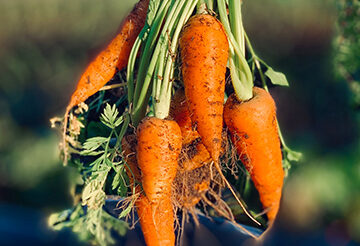In the vibrant tapestry of Santa Cruz County’s nonprofit community, Eat for the Earth stands out as an organization with a mission as bold as it is necessary: to transform the way we eat to protect the planet. This vibrant grassroots movement is not only addressing personal health but also tackling one of the most pressing issues of our time—climate change.
Reverend Beth Love, the Executive Director and driving force behind Eat for the Earth, is committed to advancing the practice of sustainable living. A longtime Santa Cruz resident, Love combines deep expertise in plant-based nutrition with a passion for environmental stewardship. Her leadership has helped establish Eat for the Earth as a necessary local resource, empowering individuals and organizations to make food choices that are healthier for both people and the planet.
The Seed of an Idea
Love recalls the genesis of Eat for the Earth as a moment of clarity in 2019. “I realized how intertwined our eating habits are with the health of the environment,” she told GT. She says the science is clear: our food system, particularly industrial animal agriculture, is a leading contributor to greenhouse gas emissions, deforestation, and water pollution. However, the solution is equally clear—shifting towards plant-based diets can significantly reduce our ecological footprint.
What started as a grassroots effort quickly grew into a movement. Love and colleague Dr. Maria Jose Hummel began hosting workshops, cooking demonstrations, and community events aimed at educating people about the environmental benefits of plant-based eating.
The Roots of the Problem
The organization recognizes that many barriers exist, from cultural habits to economic challenges, that make dietary change difficult. That’s why Eat for the Earth takes a holistic approach, offering not just education but also practical tools and ongoing support.
One of their flagship initiatives is helping businesses and institutions adopt plant-based options in their cafeterias and catering menus. “If we can influence the default food options in large settings, the ripple effect is enormous,” Beth explains. These efforts are complemented by partnerships with local farms and food producers to promote access to fresh, plant-based ingredients.
A Growing Movement
In just a few years, Eat for the Earth has achieved impressive milestones. Their outreach programs have engaged thousands of local residents, and their advocacy has inspired several organizations to commit to sustainable food policies. During the COVID-19 pandemic, they pivoted to offer virtual workshops and online resources, ensuring that their mission continued to grow even during challenging times.
Program coordinator Dr. Hummel has been an instrumental part of this worked, after decades of seeing first hand how Latinos suffer disproportionately from chronic diseases related to nutrition.
She says there are many social and environmental reasons for this, explaining “I have also seen that with education and motivation, people within marginalized and underserved communities can see amazing transformations in their health. I have seen dramatic improvements in health outcomes, that are not commonly seen in clinical practice. This continues to inspire me for sure.”
Looking to the Future
As Eat for the Earth looks ahead, their vision is both ambitious and inspiring. Beth Love envisions a future where plant-based eating is the norm rather than the exception. “We want to create a culture where sustainable food choices are accessible, celebrated, and supported by policies at every level,” she says.
One of their long-term goals is to establish a dedicated education and resource center in Santa Cruz County—a space where people can learn about plant-based cooking, sustainable agriculture, and the intersection of food and climate. .
How You Can Help
Eat for the Earth thrives on community support, and there are many ways to get involved. Whether it’s volunteering at events, donating to sustain their programs, or simply committing to incorporating more plant-based meals into your routine, every contribution makes a difference.
As Beth Love puts it, “The future of our planet depends on the choices we make today. Together, we can create a world where everyone can thrive—starting with what’s on our plates.”
To learn more about Eat for the Earth or to get involved, visit their website at www.eatfortheearth.org or follow them on social media for updates on upcoming events and initiatives.
by Elizabeth Borelli







